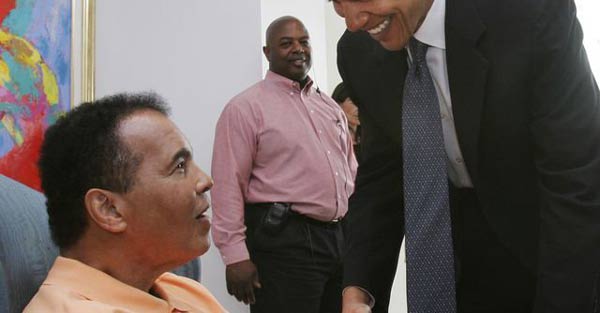BY DUNIA MAG / Twitter: @duniamagazine
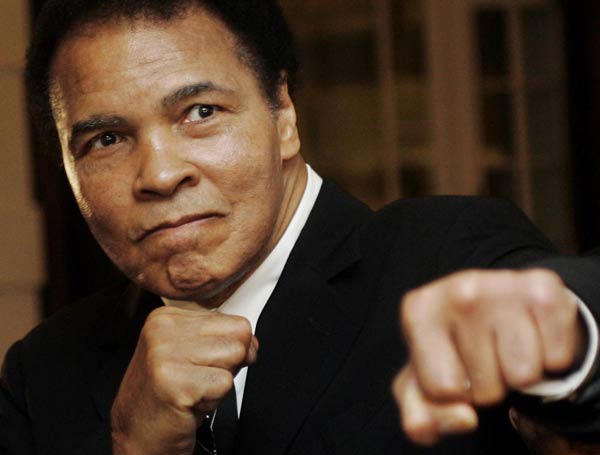
Muhammad Ali poses during the World Economic Forum in Davos, Switzerland. April 2013. REUTERS/Andreas Meier
Muhammad Ali (1942 – 2016), African American boxer and philanthropist, was born Cassius Clay Jr, in Louisville, Kentucky. In 1964, he changed his name to Muhammad Ali after joining the Nation of Islam. The former heavyweight boxing champion (father of 9 children – 7 girls and 2 boys), was diagnosed with Parkinson’s Disease in 1984.
The legendary champion’s impact both in and out of the ring was felt across the globe as an athlete, civil rights activist, and humanitarian. As the world mourns Muhammad Ali, we turn to President Obama’s tribute which sums up the imposing and extraordinarily inspiring legacy of “the greatest”.
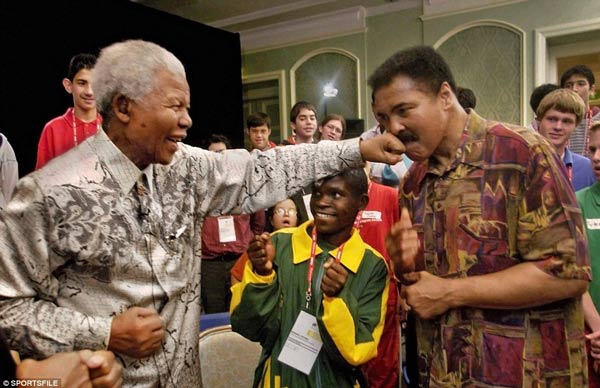
Former South African President Nelson Mandela lands a “straight left” to the chin of former World Champion Muhammad Ali as South African Special Olympics Athlete Rofhiwa looks on in June 2003
On June 4, 2016 President Obama wrote:
“Muhammad Ali was The Greatest. Period. If you just asked him, he’d tell you. He’d tell you he was the double greatest; that he’d ‘handcuffed lightning, thrown thunder into jail.’
But what made The Champ the greatest—what truly separated him from everyone else—is that everyone else would tell you pretty much the same thing.
Like everyone else on the planet, Michelle and I mourn his passing. But we’re also grateful to God for how fortunate we are to have known him, if just for a while; for how fortunate we all are that The Greatest chose to grace our time.
In my private study, just off the Oval Office, I keep a pair of his gloves on display, just under that iconic photograph of him—the young champ, just 22 years old, roaring like a lion over a fallen Sonny Liston. I was too young when it was taken to understand who he was—still Cassius Clay, already an Olympic Gold Medal winner, yet to set out on a spiritual journey that would lead him to his Muslim faith, exile him at the peak of his power, and set the stage for his return to greatness with a name as familiar to the downtrodden in the slums of Southeast Asia and the villages of Africa as it was to cheering crowds in Madison Square Garden.
‘I am America,’ he once declared. ‘I am the part you won’t recognize. But get used to me—black, confident, cocky; my name, not yours; my religion, not yours; my goals, my own. Get used to me.’
That’s the Ali I came to know as I came of age—not just as skilled a poet on the mic as he was a fighter in the ring, but a man who fought for what was right. A man who fought for us. He stood with King and Mandela; stood up when it was hard; spoke out when others wouldn’t. His fight outside the ring would cost him his title and his public standing. It would earn him enemies on the left and the right, make him reviled, and nearly send him to jail. But Ali stood his ground. And his victory helped us get used to the America we recognize today.
He wasn’t perfect, of course. For all his magic in the ring, he could be careless with his words, and full of contradictions as his faith evolved. But his wonderful, infectious, even innocent spirit ultimately won him more fans than foes—maybe because in him, we hoped to see something of ourselves. Later, as his physical powers ebbed, he became an even more powerful force for peace and reconciliation around the world. We saw a man who said he was so mean he’d make medicine sick reveal a soft spot, visiting children with illness and disability around the world, telling them they, too, could become the greatest. We watched a hero light a torch, and fight his greatest fight of all on the world stage once again; a battle against the disease that ravaged his body, but couldn’t take the spark from his eyes.
Muhammad Ali shook up the world. And the world is better for it. We are all better for it. Michelle and I send our deepest condolences to his family, and we pray that the greatest fighter of them all finally rests in peace.”
—President Obama
Biography on History.com
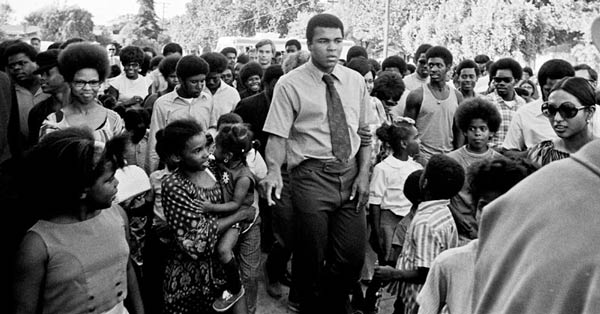
Muhammad Ali visits Modesto, California 1971
“Mel Williams, a community leader, contacted Ali and got him to visit the Modesto African-American community. Mel got the word out with only a couple hours notice. As Ali walked into the King-Kennedy Community Center, several hundred people swarmed around him.” (Golub photo)
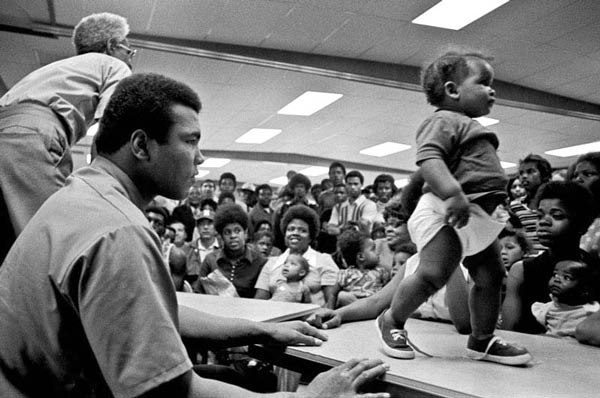
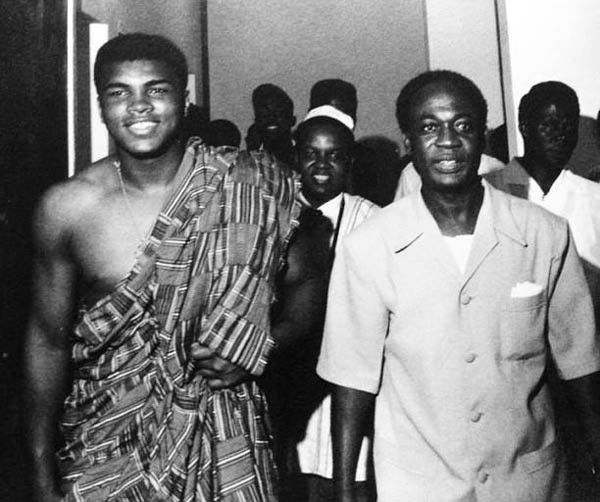
Muhammad Ali and Ghanaian President Kwame Nkrumah. 1964
“We are glad to be back home to see things for ourselves, meet pretty Ghanaian girls, take pictures, and tell our people that there are more things to be seen in Africa than lions and elephants… They never told us about your beautiful flowers, magnificent hotels, beautiful houses, beaches, great hospitals, schools, and universities.” – Muhammad Ali
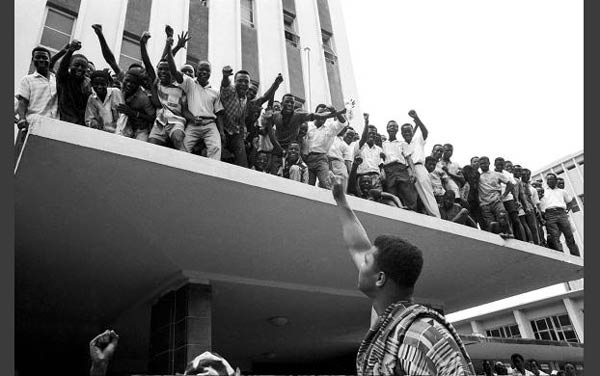
Ghana, 1964. Gerry Cranham/Sports Illustrated/Getty Images
Read about Ghana visit here
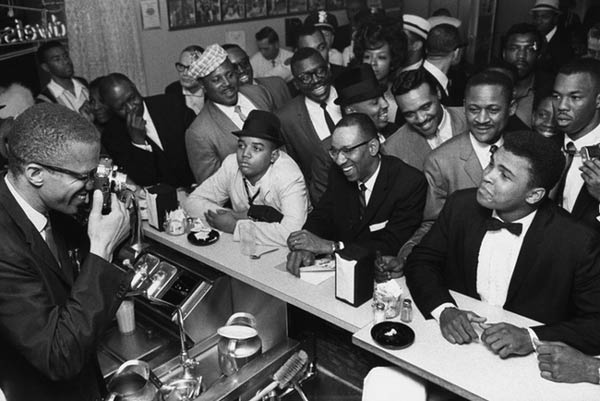
Malcolm X photographs Ali on February 1964, after his first defeat of Sonny Liston to become world heavyweight champion. Photo by Bob Gomel/The LIFE Images Collection/Getty Images
Muhammad Ali died on Friday June 3, 2016 of septic shock after being hospitalized with a respiratory illness.
— Hana Ali (@Hanayali) June 4, 2016

